
Fourrages
Scope & Guideline
Exploring the vital role of forages in food security.
Introduction
Aims and Scopes
- Forage Production and Management:
Research on the production systems of various forage species, including legumes and grasses, and their management in different climatic and ecological conditions. - Sustainability and Ecological Impact:
Studies examining the sustainability of forage systems, including their ecological impacts, biodiversity, and roles in ecosystem services. - Climate Change Adaptation:
Exploration of how forage systems can adapt to climate change, focusing on resilience strategies and the use of diverse species. - Nutritional Value and Digestibility:
Investigations into the chemical composition, digestibility, and nutritional value of forages, aimed at optimizing livestock diets. - Technological Innovations in Forage Management:
Application of digital tools, remote sensing, and innovative practices in forage management, including precision agriculture techniques. - Grassland Ecology and Functionality:
Research on the ecological roles of grasslands, including their contribution to nitrogen cycles, carbon storage, and biodiversity.
Trending and Emerging
- Protein Autonomy and Self-sufficiency:
Increasingly, research is focusing on enhancing protein self-sufficiency in livestock systems, exploring alternative protein sources and strategies to reduce reliance on imported feeds. - Agroecological Practices:
There is a growing trend towards studies that promote agroecological practices within forage systems, reflecting a shift towards sustainability and ecological balance. - Climate Resilience and Adaptation Strategies:
An emerging emphasis on developing climate resilience strategies for forage systems, including the assessment of species adaptability in changing climatic conditions. - Digital Tools and Precision Agriculture:
The integration of digital tools, remote sensing, and data analytics in forage management practices is becoming a prominent theme, enhancing decision-making processes for farmers. - Ecosystem Services from Grasslands:
Research is increasingly focusing on the multifunctionality of grasslands, examining their roles in providing ecosystem services beyond forage production, such as carbon sequestration and biodiversity enhancement.
Declining or Waning
- Traditional Forage Practices:
There is a noticeable reduction in studies focused on traditional forage management practices, as newer, more sustainable techniques and technologies gain traction. - Single-species Forage Systems:
Research centered on single-species forage systems is declining, with a growing emphasis on multi-species and diverse forage systems to enhance resilience and ecosystem services. - Passive Grazing Systems:
The exploration of passive or conventional grazing systems is less frequent, as the journal shifts focus toward more dynamic and innovative grazing strategies.
Similar Journals
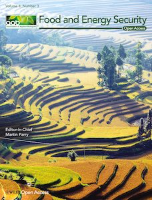
Food and Energy Security
Innovating the Future of Food Systems and Renewable EnergyFood and Energy Security, an esteemed journal published by WILEY, is dedicated to advancing the fields of food science, agriculture, and renewable energy. Since its inception in 2012, this open-access journal has provided a platform for groundbreaking research and innovative practices that address global challenges related to food production and energy sustainability. With an impressive impact factor reflected in its Q1 quartile rankings across notable categories such as Agronomy and Crop Science and Food Science, this journal is instrumental for researchers and practitioners alike who are focused on enhancing food security and promoting sustainable energy solutions. The journal's scope encompasses multidisciplinary approaches and encourages submissions that explore the intersection of food systems and energy dynamics, ensuring relevance in the evolving landscape of environmental science and policy. By offering open access to its publications, Food and Energy Security commits to making vital research accessible, fostering informed dialogue and collaboration among scholars, policymakers, and the agrifood industry worldwide.

Nature Food
Transforming Knowledge into Action for Food Security.Nature Food, an esteemed journal published by NATURE PORTFOLIO, stands at the forefront of research in Agronomy, Animal Science, and Food Science. With its E-ISSN 2662-1355 and a remarkable recognition of being ranked Q1 in three essential categories by Scopus in 2023, it is tailored for researchers, professionals, and students dedicated to the advancement of knowledge in these fields. Situated in the United Kingdom and extending its reach globally, the journal has displayed an impressive ranking, placing it in the top percentiles of Agricultural and Biological Sciences, highlighting its vital place in fostering innovative research and scholarly communication. The journal's scope encompasses a wide array of topics critical to food systems, sustainability, and agricultural practices, making it an invaluable resource for anyone looking to stay ahead in this dynamic area of study. With access options designed to enhance the visibility and dissemination of research findings, Nature Food is committed to promoting open dialogue and collaboration among the global academic community, driving forward our understanding of food security and environmental stewardship.
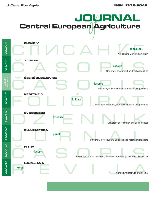
Journal of Central European Agriculture
Advancing Agricultural Knowledge Across Central EuropeThe Journal of Central European Agriculture, with ISSN 1332-9049 and E-ISSN 1332-9049, is an esteemed platform published by UNIV ZAGREB, FAC AGRICULTURE that caters to the dynamic fields of agronomy, crop science, and animal science. Since its establishment in 2000, this Open Access journal has played a crucial role in disseminating critical research findings while fostering collaboration among academics, researchers, and professionals within the agricultural community. The journal, which is based in the heart of Croatia, spans a rich history of scholarship, with its content available for free to readers and contributors alike. As reflected in its current standings, the journal has achieved a Quartile 3 ranking in Agronomy and Crop Science and Quartile 4 in Animal Science and Zoology for the year 2023, indicating its growing influence within these disciplines. With Scopus ranks placing it in the 32nd percentile among its peers, the Journal of Central European Agriculture is committed to advancing agricultural sciences not only in Central Europe but globally as it prepares for its converged years from 2007 through 2024. This journal serves as a vital resource for innovative research, practical applications, and a deeper understanding of agricultural challenges and solutions.
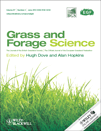
GRASS AND FORAGE SCIENCE
Leading the Dialogue on Forage Sustainability and ManagementGrass and Forage Science is a premier journal published by Wiley, dedicated to advancing the fields of agronomy and crop science, as well as environmental science management. With its ISSN 0142-5242 and E-ISSN 1365-2494, this esteemed journal has been a cornerstone of scholarly communication since its inception in 1946, and it continues to provide critical insights into the cultivation and sustainability of grasslands and forage systems through to 2024. Recognized within the academic community, it holds a distinguished Q1 ranking in Agronomy and Crop Science and a Q2 ranking in Management, Monitoring, Policy and Law, highlighting its significant impact and contribution to these essential domains. Researchers, professionals, and students alike benefit from the rigorous peer-reviewed articles that address contemporary challenges and innovations in land management, grassland farming, and ecological sustainability. While the journal operates under a subscription model, its breadth of expertise makes it an invaluable resource for anyone engaged in agricultural and environmental sciences. In an era where sustainable practices are paramount, Grass and Forage Science stands at the forefront, driving the conversation and fostering advancements in the way we manage and utilize our natural resources.
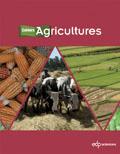
CAHIERS AGRICULTURES
Elevating agricultural science for global impact.CAHIERS AGRICULTURES is a distinguished open-access journal published by EDP Sciences S A, focusing on the vital fields of Agronomy and Crop Science, Animal Science and Zoology, as well as Management, Monitoring, Policy, and Law. With an ISSN of 1166-7699 and an E-ISSN of 1777-5949, this journal has notably maintained a strong presence in the academic landscape since its establishment, covering a wide range of topics pertinent to agricultural sciences. Based in France, CAHIERS AGRICULTURES fosters collaboration and knowledge sharing among researchers and practitioners through its open-access model, which has been in effect since 2014. The journal is recognized for its rigorous peer-review process, reflected in its competitive Scopus rankings, which place it in the Q2 quartile for both Agronomy and Crop Science, and Animal Science and Zoology. Researchers and scholars are encouraged to contribute cutting-edge findings that may influence agricultural practices and policy development. With a vision to advance sustainable agricultural practices, CAHIERS AGRICULTURES stands as a critical resource for advancing scientific knowledge and informing stakeholders in the agricultural sector.

Agricultural Science and Practice
Advancing agricultural knowledge for a sustainable future.Agricultural Science and Practice is a pivotal journal dedicated to advancing knowledge and research in the field of agricultural sciences. Published by the NATIONAL ACADEMY OF AGRARIAN SCIENCES OF UKRAINE, this journal serves as a vital resource for researchers, professionals, and students engaged in agriculture, agronomy, and related disciplines. The journal aims to disseminate high-quality, peer-reviewed articles that address contemporary issues, innovative practices, and advancements in agricultural methodologies. While currently specified as non-open access, the journal endeavors to contribute significantly to the global agricultural knowledge pool while fostering a collaborative research environment. With its base in Kyiv, Ukraine, Agricultural Science and Practice plays an essential role in highlighting regional agricultural challenges and solutions, thereby attracting a diverse readership that aspires to enhance food security and sustainable farming practices worldwide.

TROPICAL AGRICULTURE
Unveiling the complexities of Caribbean agriculture.Tropical Agriculture is a reputable journal dedicated to advancing knowledge and research in the fields of Agronomy and Development, with a particular emphasis on tropical farming practices and agricultural innovation. Published by the University of the West Indies, this journal serves as a crucial resource for researchers, professionals, and students engaged in the complexities of agriculture in the tropics. Established in 1979, it has witnessed significant contributions and continues to facilitate scholarly discussions through its quarterly publications. While the journal currently holds a Q4 ranking in both the Agronomy and Development categories, its commitment to fostering research excellence positions it as a pivotal platform for emerging studies and regional agricultural advancements. Although not an open-access publication, it provides critical insights and localized research that greatly benefit the agricultural community, particularly within the Caribbean context. Researchers and professionals in the field can rely on this journal for insightful content on tropical agricultural challenges and developments, enhancing knowledge dissemination and application across related disciplines.

Journal of Agricultural Sciences
Advancing agricultural knowledge for a sustainable future.Journal of Agricultural Sciences is an esteemed peer-reviewed journal dedicated to advancing research and knowledge in the field of agricultural and biological sciences. Published by Sabaragamuwa University of Sri Lanka, this journal has been an open access platform since 2005, providing valuable insights and innovative findings to a global audience. With an ISSN of 1391-9318 and an E-ISSN of 2386-1363, the journal currently holds a Q3 ranking in the Agricultural and Biological Sciences category, reflecting its commitment to maintaining high standards of scholarship. The journal's Scopus ranking places it at #102 out of 193 in its field, signifying its impact and relevance. Covering a wide range of topics from sustainable agriculture practices to advancements in biological research, the Journal of Agricultural Sciences serves as a crucial resource for researchers, professionals, and students alike, fostering knowledge exchange and promoting agricultural innovation. We invite you to explore our rich repository of research and contribute to the ongoing discourse in the vital area of agricultural sciences.
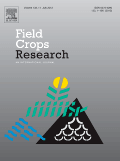
FIELD CROPS RESEARCH
Shaping the Future of Field Crops Through KnowledgeFIELD CROPS RESEARCH is a premier academic journal published by Elsevier, dedicated to advancing knowledge in the fields of Agronomy and Crop Science as well as Soil Science. Now in its 46th year of publication, this esteemed journal has established itself as a leading resource, holding a prestigious Q1 ranking in both the Agronomy and Soil Science categories, with a remarkable blend of rigorous peer-reviewed research and innovative findings. With a Scopus ranking of #27/406 in Agronomy and #20/159 in Soil Science, and a notable 93rd and 87th percentile respectively, FIELD CROPS RESEARCH plays a vital role in informing practices that drive sustainable agriculture and optimize crop production. Although not an open access journal, it remains highly accessible to the global research community and offers critical insights that influence policy and agricultural practices worldwide. Researchers, professionals, and students are encouraged to delve into this journal, as it continues to shape the future of field crop research through impactful studies and comprehensive reviews.

Crop Forage & Turfgrass Management
Cultivating knowledge in forage and turfgrass science.Crop Forage & Turfgrass Management, published by WILEY, serves as an essential platform for researchers, professionals, and students in the fields of agronomy, crop science, plant science, and soil science. With a focus on advancing knowledge in the management of crops, forage systems, and turfgrass, this journal plays a pivotal role in disseminating innovative research and practical applications that drive agricultural sustainability and productivity. Despite its Q3 ranking in various agricultural and biological science categories according to Scopus, it aims to enhance its impact and relevance in the academic community through high-quality publications. As a journal converged from 2015 to 2024, it invites contributions that address contemporary challenges and solutions in crop management, ensuring accessibility to vital knowledge for the advancement of agricultural practices. Situated in the United States, it also reflects the diverse agricultural landscapes and practices of the region, making it a valuable resource for a global audience.